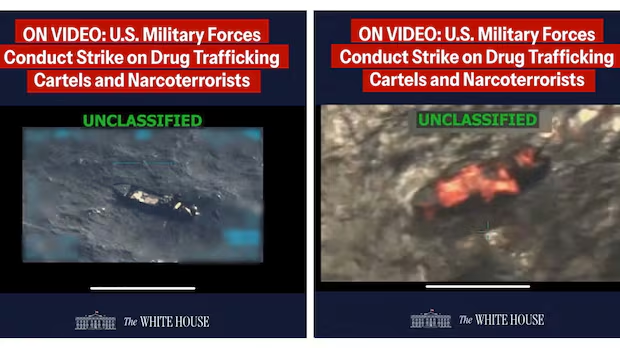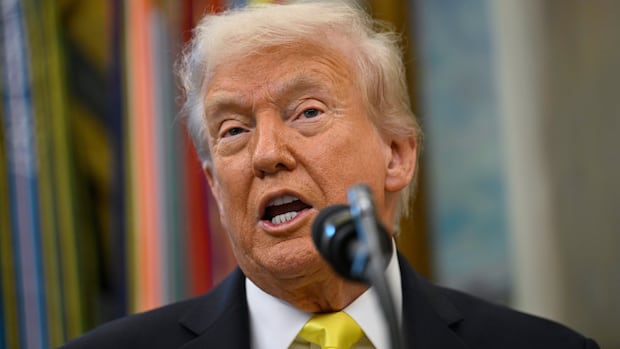U.S. President Donald Trump on Friday confirmed a U.S. military strike on an alleged “drug-carrying submarine” in the Caribbean amid reports the military is holding two survivors aboard a navy ship after its strike killed two others.
“We attacked a submarine, and that was a drug-carrying submarine built specifically for the transportation of massive amounts of drugs” Trump said while hosting Ukrainian President Volodymyr Zelenskyy at the White House.
He did not comment on how many had been killed in the strike or how many had survived it. Secretary of State Marco Rubio did not dispute that there were survivors, but he repeatedly said details would be forthcoming.
The reports that there are two survivors came from Reuters, which cited three sources familiar with the matter.
The disclosure, which has not been previously reported, raises the possibility that the survivors from Thursday’s strike are the first prisoners of war in a conflict declared by Trump against a “narcoterrorist” threat he says is emanating from Venezuela.
The Pentagon did not immediately respond to a request for comment.
What’s President Donald Trump’s endgame with repeated U.S. strikes on boats near Venezuela? Andrew Chang breaks down the threats the Trump administration says it’s reacting to and why Venezuela’s relationship with China may also be a factor.
Images provided by Getty Images, The Canadian Press and Reuters.
Prior to Thursday’s operation, U.S. military strikes against suspected drug boats off Venezuela had not left any known survivors.
The strikes began in early September. Videos presented by the Trump administration have showed vessels being destroyed, but information about the identities of individuals or the cargo on the boats has not been released publicly by the administration.
One of the sources said the vessel struck on Thursday moved below the water and was possibly a semi-submersible, which is a submarine-like vessel used by drug traffickers to avoid detection.
Five sources familiar with the matter said the U.S. military staged a helicopter rescue to pick up the survivors of the attack and bring them back to the U.S. warship.
U.S. lawmakers asking questions
The Trump administration has said the previous strikes killed 27 people, raising alarms among some legal experts, many Democratic lawmakers and at least two Republicans, Sen. Rand Paul, of Kentucky, and Sen. Lisa Murkowski, of Alaska. Critics question whether the strikes adhere to the laws of war.
On Wednesday, Trump disclosed he had authorized the Central Intelligence Agency to conduct covert operations inside Venezuela, adding to speculation in Caracas that the United States is attempting to topple Venezuelan President Nicolas Maduro.
The Trump administration in August doubled its reward for information leading to Maduro’s arrest to $50 million US, accusing him of links to drug trafficking and criminal groups that Maduro denies.
Trump has repeatedly accused Venezuela of being a hub for trafficking of the deadly drug fentanyl, but U.S. records have shown that Mexico is the main source of fentanyl. Historically, Venezuela’s main illegal drug export has been cocaine.
U.S. President Donald Trump confirmed he authorized the CIA to conduct covert operations in Venezuela, escalating efforts to pressure President Nicolas Maduro’s government. Trump said he authorized the action because large amounts of drugs were entering the United States from Venezuela, much of it by sea. Venezuela’s Foreign Ministry condemned the move in a statement, saying the action ‘constitutes a very serious violation of international law and the United Nations’ Charter.’
Colombian President Gustavo Petro, who quarrelled with the Trump administration over the deportation of migrants, said last week there were indications that Colombia citizens were on one of the previous vessels that was bombed. Petro did not specify how many individuals, and the White House slammed his comments as “baseless and reprehensible.”
Meanwhile, relatives of a Trinidadian man, Chad Joseph, said they believe he was killed in a U.S. strike announced on Tuesday, along with another Trinidadian.
Fishermen from Trinidad and Tobago have expressed concerns about the strikes as they depend on the waters for their livelihood.
High-ranking U.S. official in the region to resign
The strikes come against the backdrop of a U.S. military buildup in the Caribbean that includes guided missile destroyers, F-35 fighter jets, a nuclear submarine and around 6,500 troops.
In a surprise move amid escalating tensions with Venezuela, the Pentagon announced Thursday that the admiral who leads U.S. military forces in Latin America will step down at the end of this year, two years ahead of schedule.
The top Democrat on the Senate’s armed services committee, Jack Reed, of Rhode Island, called Adm. Alvin Holsey’s unexpected resignation troubling, given mounting fears of a potential U.S. confrontation with Venezuela.
“Admiral Holsey’s resignation only deepens my concern that this administration is ignoring the hard-earned lessons of previous U.S. military campaigns and the advice of our most experienced warfighters,” Reed said in a statement.
Defence Secretary Pete Hegseth, in a social media post, did not disclose the reason for the departure of Holsey, though he did praise the four-star officer.
Front Burner26:47Donald Trump’s war on drug cartels
Less than a week ago, the Pentagon announced its counter-narcotics operations in the region would not be led by the Miami-based Southern Command, but by II Marine Expeditionary Force, a unit capable of rapid overseas operations that is based at Camp Lejeune in North Carolina.
That decision came as a surprise to U.S. military-watchers, since a combatant command like Southern Command would normally lead any high-profile operations.
Source link







